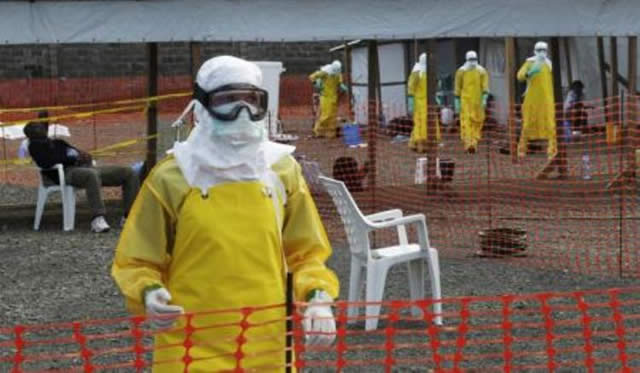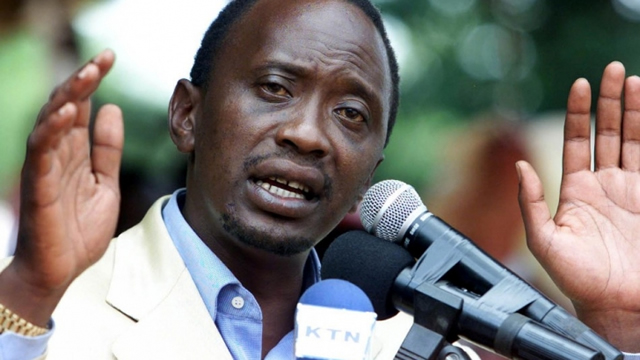Senegal becomes fifth West African state affected by Ebola


Medecins Sans Frontieres (MSF) health workers prepare at ELWA’s isolation camp during the visit of Senior United Nations System Coordinator for Ebola, David Nabarro, in Monrovia on August 23 — Reuters
DAKAR/CONAKRY/CHICAGO — Senegal, a major hub for the business and aid community in West Africa, has become the region’s fifth country to confirm a case of Ebola after a student arrived from neighbouring Guinea carrying the disease.Health Minister Awa Marie Coll Seck told a news conference yesterday that the young man had turned up for treatment at a hospital in the Senegalese capital Dakar on Tuesday but concealed that he had had close contact with victims in his home country.
She said Guinean authorities said the student from the Guinean capital Conakry had disappeared three weeks ago while under surveillance for having close contact with Ebola victims.
“The results of tests carried out by the Pasteur Institute in Dakar were positive (for Ebola),” the minister said.
The worst ever outbreak of the deadly virus, first detected in the jungles of southeast Guinea in March, has killed more than 1,550 people.
Most of these were in Guinea, Sierra Leone and Liberia, but six people have also died in Nigeria.
Dakar is a regional hub for UN agencies and aid groups serving the Sahel region of West Africa. It also serves as a regional base for many companies, from financial services to banking and tobacco.
In an effort to insulate itself from the worst ever Ebola epidemic, Senegal announced last week it was closing its southern land border with Guinea. It also banned flights to and from Sierra Leone, Liberia and Guinea, but not Nigeria.
On Thursday, the World Health Organisation said that the Ebola outbreak in West Africa could exceed 20,000 cases, which is more than six times as many as doctors know about now.
Meanwhile, riots broke out in Guinea’s second-largest city Nzerekore over rumours that health workers had infected people with the deadly Ebola virus, a Red Cross official and residents said yesterday.
A crowd of young men, some armed with clubs and pistols, set up barricades across the southern city on Thursday and threatened to attack the hospital before security forces moved in to restore order.
Gunshots were fired by the rioters and several people were injured, said Youssouf Traore, president of the Guinean Red Cross.
“A rumour, which was totally false, spread that we had sprayed the market in order to transmit the virus to locals,” Traore said. “People revolted and resorted to violence, prompting soldiers to intervene.”
Local Red Cross workers had to flee to the military camp with their medical equipment.
Another resident said the security forces were preventing people leaving their neighbourhoods overnight.
The highly contagious Ebola virus was first reported in south-eastern Guinea in March and to date has killed more than 1,500 people in the worst outbreak in history.
More than 400 people have died in Guinea, although the rate of infection is slower than in neighbouring Liberia and Sierra Leone.
Conakry says it has controlled the epidemic but has expressed concern over rising cases in the southern border region, which it blames on victims spilling over from neighbouring countries in search of better treatment.
The Guinean government’s last health report for 26 August showed there were 12 suspected, probable and confirmed Ebola cases in Nzerekore.
Meanwhile, genetic studies of some of the earliest Ebola cases in Sierra Leone reveal more than 300 genetic changes in the virus as it leapt from person to person, changes that could blunt the effectiveness of diagnostic tests and experimental treatments now in development, researchers said on Thursday.
“We found the virus is doing what viruses do. It’s mutating,” said Pardis Sabeti of Harvard University and the Broad Institute, who led the massive study of samples from 78 people in Sierra Leone, all of whose infections could be traced to a faith healer whose claims of a cure attracted Ebola patients from Guinea, where the virus first took hold.
The findings, published in Science, suggest the virus is mutating quickly and in ways that could affect current diagnostics and future vaccines and treatments, such as GlaxoSmithKline’s Ebola vaccine, which was just fast-tracked to begin clinical trials, or the antibody drug ZMapp, being developed by California biotech Mapp Biopharmaceutical.
The findings come as the World Health Organisation said that the epidemic could infect more than 20,000 people and spread to more countries. A WHO representative could not immediately be reached for comment on the latest genetic study.
Study co-author Robert Garry of Tulane University said the virus is mutating at twice the rate in people as it was in animal hosts, such as fruit bats.
Garry said the study has shown changes in the glycoprotein, the surface protein that binds the virus to human cells, allowing it to start replicating in its human host. “It’s also what your immune system will recognise,” he said.
In an unusual step, the researchers posted the sequences online as soon as they became available, giving other researchers early access to the data.
Erica Ollmann Saphire of the Scripps Research Institute in La Jolla, California, has already checked the data to see if it impacts the three antibodies in ZMapp, a drug in short supply that has been tried on several individuals, including the two US missionaries who contracted Ebola in Sierra Leone and who have since recovered.
“It appears that they do not (affect ZMapp),” said Saphire, who directs a consortium to develop antibody treatments for Ebola and related viruses. But she said the data “will be critical to seeing if any of the other antibodies in our pool could be affected.”— Reuters.








Comments